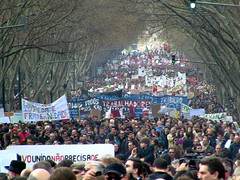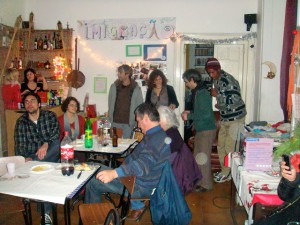“The other organizations throughout Europe that work to help immigrants are in awe of what we do here, something they have been unable to do,” Timóteo explains with ethusiastic hand gestures in the air, “to run an organization for immigrants that is completely autonomous and not dependent on government or international funds.” He repeats this point to make sure everyone in the room has understood, this place and the people in it, are one of a kind in Europe and perhaps even the world. When you, as an immigrant, come to the cramped but welcoming offices of Solidariedade Imigrante in downtown Lisbon seeking help with a problem, this organization with over 19,000 members does not just feel sorry for you and start on the problem, first they explain who they are and what their mission is. They also invite that person to become a member of this multi-faceted organization, which involves getting a membership card for a 2 euro a month fee.
 Timóteo Macedo, President of Solidariedade Imigrant looks me square in the eye to make sure I’m listening, “Help is a reciprocal process. We must help each other. Your problem is not unique to you, many others have gone through it, and they can now help you. Just as you can help someone else one day, or right now, you can help us pay the electric bill, for example.” He also goes over the growing force within Portugal that this organization has become, “In the late 90’s when we started, an immigrant could be stopped by the police and arrested on the spot like a criminal. That is not true anymore, now you cannot be arrested. Because we fought this policy, in the halls of government and on the streets. And the government had to take notice.”
Timóteo Macedo, President of Solidariedade Imigrant looks me square in the eye to make sure I’m listening, “Help is a reciprocal process. We must help each other. Your problem is not unique to you, many others have gone through it, and they can now help you. Just as you can help someone else one day, or right now, you can help us pay the electric bill, for example.” He also goes over the growing force within Portugal that this organization has become, “In the late 90’s when we started, an immigrant could be stopped by the police and arrested on the spot like a criminal. That is not true anymore, now you cannot be arrested. Because we fought this policy, in the halls of government and on the streets. And the government had to take notice.”
Walking from room to room it is hard to ignore the number of people and the diversity of the faces and accents all around. Many seem to be waiting to speak with someone, perhaps about their own issues with legal documents and paperwork. Others are sitting in two’s around a table in the middle of the room, busy explaining what specific pages mean. Their Portuguese is accented and their patience and expertise indicates they themselves have been through this process at one time not so long ago. The walls have inspirational quotes in Portuguese, along with hand drawn flags; the red crescent, the globe from the Brazilian flag, the spinning wheel from the Indian flag. Every now and then a wall has an invitation to an upcoming event; debates, dinners, rallies, etc. I notice there has recently been a Hungarian night consisting of traditional music and food, a local volunteer by the name of Christof explains that members themselves take the lead for such events, “Sometimes members might decide to do their own events about their own culture, and so we might have Russian lessons or a Russian night, for example.” He goes on to explain a long list of services the organization provides, including: job training, youth counseling, housing assistance, and language instruction. As he gets into very involved and impressive details, I’m distracted by another office we’ve walked into with a bank of computers and tall book shelves adorned with signs that read “Please respect the order the books are in, they belong to all of us.”
As our meeting draws to an end Timóteo turns the conversation towards my own work and asks what I’ve been working on during this visit to Portugal. I explain my visit to the home of Aristides de Sousa Mendes and my interest in spreading the word about his story and his legacy. Timóteo nods like my words make perfect sense. “In this place we are Aristides de Sousa Mendes… we save lives everyday. First and foremost we value human lives… -The law comes second,” he smiles.


 2011 is the year where many observers and so called experts around the world scramble to understand how it is that so many dictatorships suddenly arrived at a crisis. As people take to the streets and battles take place in city squares throughout the middle east, we discover that in fact many of the dictators of these regions have not been well studied or understood.
2011 is the year where many observers and so called experts around the world scramble to understand how it is that so many dictatorships suddenly arrived at a crisis. As people take to the streets and battles take place in city squares throughout the middle east, we discover that in fact many of the dictators of these regions have not been well studied or understood. Through the numerous jobs I do as both a journalist and an editor to help fund my own work here on this site, I end up editing many documents relating to new media and its significance. Among the terms and theories that are frequently kicked around is the one about how through today’s social media applications and collective spaces on the web, like minded people can find each other and further develop their projects or networks. No doubt, this is happening and will continue to happen; yet while many celebrate this development, I’m left concerned and wondering about the flip side of this coin.
Through the numerous jobs I do as both a journalist and an editor to help fund my own work here on this site, I end up editing many documents relating to new media and its significance. Among the terms and theories that are frequently kicked around is the one about how through today’s social media applications and collective spaces on the web, like minded people can find each other and further develop their projects or networks. No doubt, this is happening and will continue to happen; yet while many celebrate this development, I’m left concerned and wondering about the flip side of this coin. One Saturday in March some 200,000 people took to the streets of Lisbon to express their frustration and desperation with the government’s performance, corruption and its economic/social policies. It was in fact a beautiful day filled with creative and humorous approaches to protesting from a city (and a country) that knows a bit about taking to the streets to demand a better future.
One Saturday in March some 200,000 people took to the streets of Lisbon to express their frustration and desperation with the government’s performance, corruption and its economic/social policies. It was in fact a beautiful day filled with creative and humorous approaches to protesting from a city (and a country) that knows a bit about taking to the streets to demand a better future. You may think the media and the social networks have told you all that needs to be known about conditions on the ground in Japan, but hearing it first hand gives you a far greater understanding. In the days following the massive earthquake and tsunami, Karamoon contacted me from his home in Tokyo. He wasn’t sure how much longer he could remain in his home, or on the other hand, if he wouldn’t have to stay in doors for two weeks to avoid radioactive winds.
You may think the media and the social networks have told you all that needs to be known about conditions on the ground in Japan, but hearing it first hand gives you a far greater understanding. In the days following the massive earthquake and tsunami, Karamoon contacted me from his home in Tokyo. He wasn’t sure how much longer he could remain in his home, or on the other hand, if he wouldn’t have to stay in doors for two weeks to avoid radioactive winds.